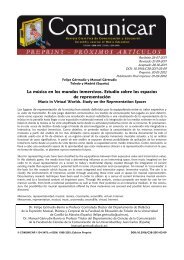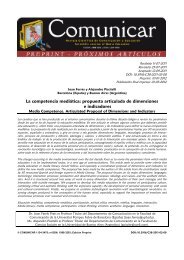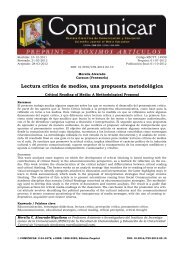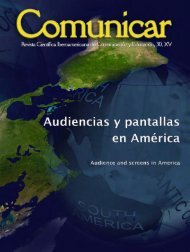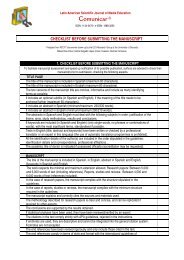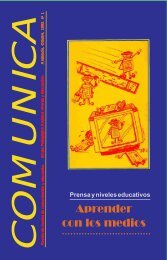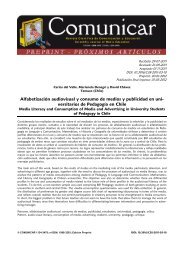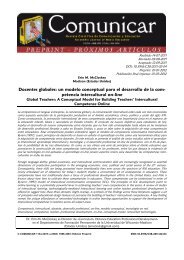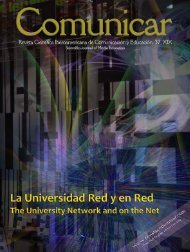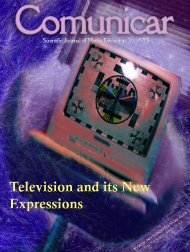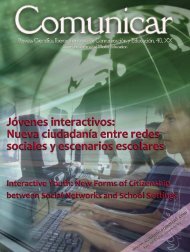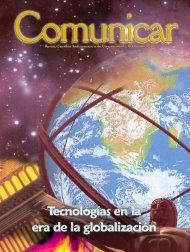Comunicar 39-ingles - Revista Comunicar
Comunicar 39-ingles - Revista Comunicar
Comunicar 39-ingles - Revista Comunicar
You also want an ePaper? Increase the reach of your titles
YUMPU automatically turns print PDFs into web optimized ePapers that Google loves.
54<strong>Comunicar</strong>, <strong>39</strong>, XX, 20121. IntroductionThe term «information» seems deceptively innocuous,uncomplicated and neutral. Finding, evaluatingand using information seems to be an everyday activityjust like breathing, of which we are barely conscious.Information, however, is intricately linked with issuesof power, hegemony and something as basic as survivalin contemporary society. That is why informationand communication have been a key focus in efforts asearly as 1960s to establish a new world order, and itis only appropriate that information literacy is nowconsidered an intrinsic component of media literacyprograms.Information seeking and processing is becomingincreasingly complex with the multiplication of informationsources and channels, the breaking-down ofpast gate-keeping institutions, global media flows andthe shift from consuming information to prosuminginformation. Our information landscapes include conventionaland new media sources like libraries, massmedia, alternative media, folk media, archives, signsand billboards, commercial material and oral communications.Navigating these landscapes requires severaldifferent literacies. The new digital media, increasinglypopular among young people all over the world,require an additional set of critical literacies because avast amount of information on new media is usergenerated.The rapid developmentof new media platformshas added new dimensions tomedia literacy programs.New media literacy is aconvergence of all literacydeveloped over the past centuriesincluding classic literacy,audiovisual literacy, digital literacyand information literacy,with a humanistic perspective(Pérez -Tor nero & Varis,2010). Based on this notion ofnew literacy, Chen, Wu andWang (2010) propose a frameworkthat offers a systematicview of new media literacy.They propose that new medialiteracy be understood as twocontinuums from consuming toprosuming literacy and fromfunctional to critical literacy.Media educators all over the world have also realizedthat literacy practices –including media and informationliteracy– are culturally situated practices. AUNESCO declaration in Prague (2003) urged theworld’s governments to develop interdisciplinary programsto promote information literacy as a necessarystep towards creating a literate citizenry, an effectivecivil society and a competitive workforce. Cautionmust be exercised in responding to such a call. Thepast practice of imposing Eurocentric practices andcurricula in all parts of the world has been heavily criticized.How information structures are organized indifferent geo-political locations; issues of access, availabilityand participation; and how active audiencesnegotiate their own meanings based on what theybring to a text (UNESCO curriculum) are importantfactors to consider in designing information literacyprograms. Understanding of economic, cultural, politicaland ethical obstacles to information literacy is alsovital. The role of empirical research in understandingyoung people’s information needs, their informationseeking behavior, and what different literacies theybring to this process is, therefore, crucial in designingsuccessful and culturally relevant media educationprograms. At the same time empirical research wouldhelp us understand if youth practices vis a vis informationbehavior are distinctly different from the precedinggenerations. «Comparative Research in YouthMedia participation» supported by the Academy ofFinland is an example of empirical research that canChen, Wu, and Wang (2010).contribute to meaningful media literacy programs. Theproject carried out between 2009-11 in Finland,Egypt, India and Argentina attempted to understandyouth media participation practices in four different© ISSN: 1134-3478 • e-ISSN: 1988-3293 • Pages 53-62



